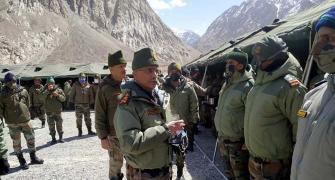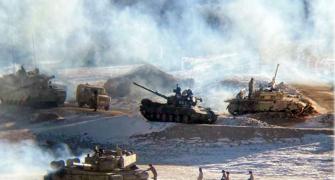After nearly 15 months of face-off, the Indian and Chinese armies have completed the disengagement process and restored the pre-standoff ground position in Gogra in eastern Ladakh, in a significant forward movement towards restoration of peace and tranquillity in the region.

Announcing the development, the Indian Army said on Friday that the disengagement process was carried out on August 4 and 5 and all temporary structures as well as other allied infrastructure created by both sides have been dismantled and mutually verified subsequently.
The disengagement in the area around Gogra or Patrolling Point-17A (PP-17A) came over five months after the two sides withdrew their troops and weapons from the North and South banks of Pangong Lake areas.
The Army said the disengagement process at PP-17A was carried out in line with the outcome of the 12th round of military talks that had taken place on July 31 at Chushul-Moldo meeting point in eastern Ladakh.
People familiar with the development said a buffer zone has been created and no patrolling will take place in the area, adding the focus in the next round of military talks will be on the Hot Springs area.
"As an outcome of the meeting, both sides agreed on disengagement in the area of Gogra. The troops in this area have been in a face-off situation since May last year," the Army said in the statement titled 'disengagement at PP-17A'
"As per the agreement, both sides have ceased forward deployments in this area in a phased, coordinated and verified manner. The disengagement process was carried out over two days: August 4 and 5," it said.
In the statement, the Army said the troops of both sides are now in their respective permanent bases.
"With this one more sensitive area of face-off has been resolved. Both sides have expressed commitment to take the talks forward and resolve the remaining issues along the LAC in the Western Sector," the Army said.
The eastern Ladakh is referred to as Western Sector by the government.
Both sides had carried out partial disengagement in Gogra as well as Hot Springs last year. However, the process could not be completed following fresh skirmishes along the South bank of Pangong Tso areas.
"All temporary structures and other allied infrastructure created in the area by both sides have been dismantled and mutually verified. The landform in the area has been restored by both sides to pre-standoff period," the Army said.
It said the disengagement agreement ensures that the Line of Actual Control (LAC) in the area will be strictly observed and respected by both sides, and that there is no unilateral change in the status quo.
"The Indian Army along with ITBP is totally committed to ensure the sovereignty of the nation and maintain peace and tranquility along the LAC in the Western Sector," the Army said.
With the completion of the disengagement in PP 17A, the focus now shifts to Hot Springs as well as Depsang and Demchok.
In the 12th round of military talks, the two sides agreed to resolve the pending issues at the remaining friction points in an "expeditious" manner.
A joint statement released after the talks had said the two sides had a "candid and in-depth exchange" of views relating to the disengagement and that the meeting further enhanced mutual understanding.
India has been insisting that the resolution of the outstanding issues, including at Depsang, Hot Springs and Gogra, is essential for the overall ties between the two countries.
The 12th round of military talks took place over two weeks after External Affairs Minister S Jaishankar firmly conveyed to his Chinese counterpart Wang Yi that the prolongation of the existing situation in eastern Ladakh was visibly impacting the bilateral ties in a "negative manner".
The two foreign ministers had held a one-hour bilateral meeting on the sidelines of a conclave of the Shanghai Cooperation Organisation (SCO) in Tajik capital city Dushanbe on July 14.
In the meeting, Jaishankar told Wang that any unilateral change in the status quo along the LAC was "not acceptable" to India and that the overall ties can only develop after full restoration of peace and tranquillity in eastern Ladakh.
The border standoff between the Indian and Chinese militaries erupted on May 5 last year following a violent clash in the Pangong lake areas and both sides gradually enhanced their deployment by rushing in tens of thousands of soldiers as well as heavy weaponry.









